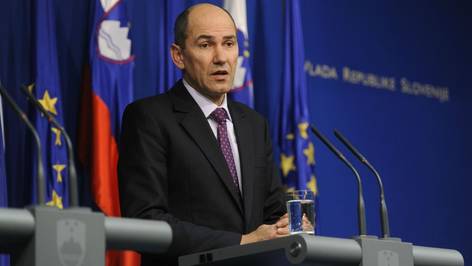NEWS
Prime Minister Janša: "The purpose of the golden fiscal rule is to protect Slovenian taxpayers"
The Prime Minister of the Republic of Slovenia, Janez Janša, appeared on the television show Odmevi yesterday evening, where he pointed out that the purpose of incorporating the golden fiscal rule into Slovenia's constitution was not to please the EU, but actually for the sake of the country itself and its credibility in the eyes of its partners abroad. He stressed that this particular measure was intended "to safeguard Slovenian taxpayers, who should receive trade-union protection from excessive borrowing by irresponsible authorities which has been a characteristic feature of the past three years". It also means the responsibility to protect future generations from irresponsible increases in borrowing that could take the whole country back to the situation in ex-Yugoslavia," he added.
In this context, he explained that there was finally an indication of "the possibility to incorporate the golden fiscal rule into the Constitution and to harmonise the implementing legislation in September" at the joint meeting between the presidents of the parliamentary parties, parliamentary group leaders and deputies of the national communities. According to the Prime Minister, it will then become evident "whether we have actually made a step closer to finding a solution or whether we have only delayed arriving at a solution to a problem that will resurface again". He went on to add that the possibility of linking the vote of confidence to the adoption of the fiscal rule still existed if this would enhance the chances of this rule being adopted. The Prime Minister recalled that commitments had already been made to adopt the golden fiscal rule before this government took office, and that the government was merely honouring its previous pledges.
During his interview, the Prime Minister also said that the parliamentary parties had reached an agreement in principle at the meeting to coordinate the issues relating to the Slovenian Sovereign Holding, the bank rehabilitation agency or fund, and the act governing the implementation of the golden fiscal rule according to the partnership principle. He explained that it meant that the proposals put forward by all the parliamentary parties would be considered equally before a decision was reached by the government, and that efforts would be made to find optimal solutions.
Concerning the Slovenian Sovereign Holding, the Prime Minister explained that the adoption of the relevant act was urgent in order to address the problems faced by Slovenia's banks. In his view, the presidents of the parliamentary parties and the parliamentary group leaders had found a solution and would attempt to find a way to rehabilitate Slovenian banks outside the holding, "which will probably hurt Slovenian taxpayers more than if it was done within the holding itself, because the holding would be used as a buffer to mitigate the painful effects of this process". The Prime Minister gave assurances that, considering that the majority of the social partners shared this view, efforts would be made to find a solution in this regard. This slightly reduces the need to adopt the Slovenian Sovereign Holding Act, which may now not go ahead until September.
The Prime Minister commented on speculation concerning a new coalition in the event that there is a failure to reach consensus on the fiscal rule – and an eventual vote of confidence – by saying that the coalition government comprised five different political parties, each being equal, and that "no one imposes restrictions on their actions, meaning anyone is free to discuss a different coalition. This cannot be prevented." In this context, Prime Minister Janša pointed out that the coalition had played a role in the events of the previous day, which "has given us further hope". "If this coalition was not united in sticking to this measure, there would be no such agreement today," the Prime Minister added.
During his televised interview, Prime Minister Janša further said that the government would meet next week to discuss important budgetary issues since the 2013-2014 draft budgets had to be ready before 1 October "because there is less money available to meet our needs, which means that reserves should somehow be found and the second part of the Fiscal Balance Act implemented".





